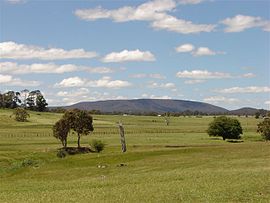New England, Australia
|
New England New South Wales |
|||||||||||||||
|---|---|---|---|---|---|---|---|---|---|---|---|---|---|---|---|

Mount Duval in New England
|
|||||||||||||||
| Population | 202,160 (2006) | ||||||||||||||
| State electorate(s) | Northern Tablelands, Tamworth, Liverpool Plains, | ||||||||||||||
| Federal Division(s) | New England | ||||||||||||||
|
|||||||||||||||
New England or New England North West is the name given to a generally undefined region in the north of the state of New South Wales, Australia about 60 kilometres (37 miles) inland, that includes the Northern Tablelands (or New England Tablelands) and the North West Slopes regions.
The region has been occupied by Indigenous Australians for thousands of years, notably in the west by the Kamilaroi people. In the highlands, the original languages, which are now extinct, were Anaiwan (or Nganaywana) to the south of Guyra and Ngarrabal and Marabal to the north of Guyra.
The first European to explore the New England area was English explorer John Oxley, who crossed the southern part of the New England Range near the Apsley Falls before he discovered and named Port Macquarie in 1818. In 1827 Allan Cunningham travelled north along the western edge of the Range until he reached the Darling Downs in Queensland. In 1831 Thomas Mitchell reached Wallamoul Station near Tamworth and explored to the Namoi River then followed it to Narrabri. Moving on, Mitchell found a deep, broad river which was the Gwydir. In 1832, Mitchell cut across the plains to the Gwydir River near Moree. The team then spent several weeks charting the tributaries between the Gwydir and the Barwon Rivers.
Hamilton Collins Sempill was the first settler in the New England area when he took up the 'Wolka' run in 1832, establishing slab huts where 'Langford' now stands close to Walcha. During the 1830s further squatters moved their sheep flocks onto the Northern Tablelands as they had been displaced by the Australian Agricultural Company, which dominated resources in the Hunter Valley. When the area was opened up for settlement in the 1830s, this led to the gazetting of nine pastoral districts. These districts had a small police force and a Commissioner of Crown Lands.
...
Wikipedia
